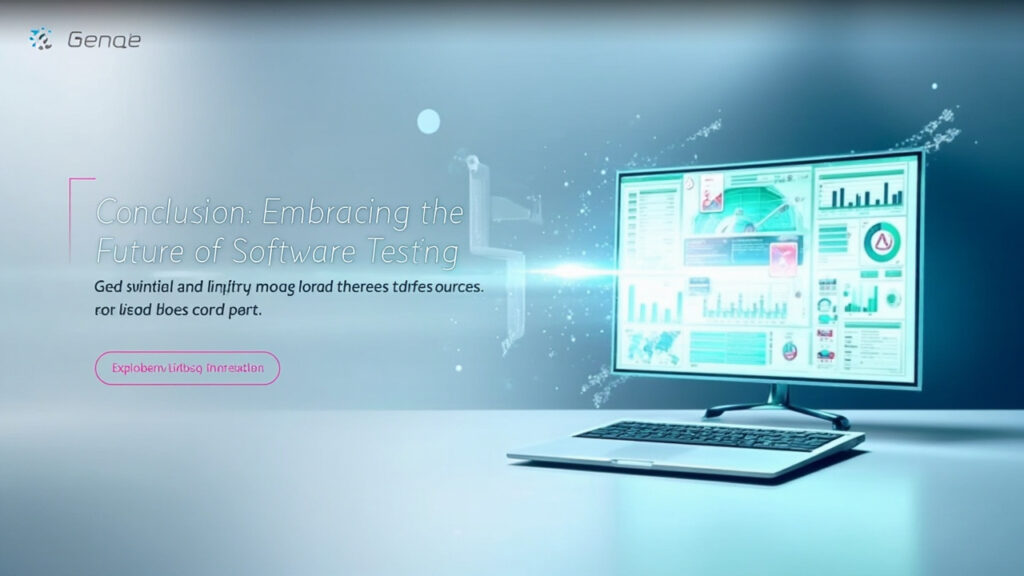In the rapidly evolving world of software development, the pressure to release high-quality products quickly is more intense than ever. Traditional testing methods are struggling to keep pace with the complexities of modern software applications, creating a bottleneck that can delay releases and compromise quality. This post delves into how advanced software testing tools are transforming the landscape, offering more speed, accuracy, and efficiency in testing processes.
For developers, quality assurance professionals, and project managers, understanding these tools is not just about keeping up with trends; it’s about staying ahead of them. By the end of this article, you will have a comprehensive understanding of the latest advancements in software testing tools, including an insightful look into how AI-driven platforms like GenQE are revolutionizing the field.
The Evolution of Software Testing Tools

Software testing has come a long way from its manual testing roots. As software development processes have accelerated, thanks to methodologies like Agile and DevOps, the tools and technologies used in testing have also needed to evolve.
From Manual to Automated Testing
The shift from manual to automated testing marked a significant milestone in the testing domain. Automated testing tools could execute tests faster and more frequently, which was a boon for continuous integration and delivery practices. However, early automated tools still required heavy setup and maintenance. Over time, developers and testers have sought ways to reduce the burden of maintaining these tools while enhancing their effectiveness.
The Rise of Integrated Testing Environments
As development environments became more integrated, so too did testing tools. Modern tools are not just standalone utilities but are part of larger development ecosystems, capable of interacting with code repositories, build tools, and deployment mechanisms. This integration allows for smoother workflows and better synchronization between teams, which is crucial for Agile practices.
The Impact of AI and Machine Learning
The latest iteration in the evolution of testing tools involves artificial intelligence and machine learning. These technologies are making automated testing smarter by enabling tools to learn from data, predict outcomes, and adapt to changes without human intervention. AI-driven tools can analyze vast amounts of data and identify patterns that would be impossible for humans to spot, leading to more effective and efficient testing.
Key Challenges in Modern Software Testing

Despite advancements, several challenges persist in software testing. Addressing these is crucial for any tool aiming to be effective in today’s software development landscape.
Keeping Up with Rapid Development Cycles
Agile methodologies promote fast development and frequent releases. Testing tools must provide quick feedback to developers without becoming a bottleneck. This requires tools to be more than just fast; they must also be highly responsive and capable of integrating smoothly into the development process.
Ensuring Comprehensive Test Coverage
As applications grow in complexity, ensuring that every part of the application is tested becomes more challenging. Tools must not only cover a wide range of application scenarios but also adapt to changes in the application structure. This requires dynamic testing capabilities that can adjust as the application evolves.
Integrating with Modern Development Practices
Testing tools must seamlessly integrate with continuous integration/continuous deployment (CI/CD) pipelines and DevOps practices, enabling tests to be part of the main development workflow without disrupting it. This integration is crucial for maintaining the speed and efficiency of development cycles.
The Role of AI in Enhancing Software Testing Efficiency

Artificial Intelligence is setting a new standard in software testing by addressing many of the traditional challenges faced by testing tools.
AI-Driven Test Generation
AI can analyze software requirements and user behavior data to automatically generate test cases. This not only speeds up the testing process but also helps in achieving more comprehensive test coverage by identifying edge cases that might not be considered during manual test case design.
Smart Test Execution
By prioritizing test cases based on risk and potential impact, AI-driven tools ensure that critical issues are identified early. This intelligent prioritization helps in optimizing the testing efforts and resources.
Self-Healing Test Scripts
AI tools can automatically update test scripts when changes occur in the application UI, reducing the need for manual maintenance and minimizing downtime due to broken tests. This feature is particularly valuable in dynamic environments where frequent updates are common.
Introduction to GenQE: A Paradigm Shift in Software Testing

GenQE represents the forefront of AI-driven testing solutions designed to overcome the limitations of traditional tools while enhancing the efficiency and effectiveness of testing processes.
Overview of GenQE
As an advanced AI-powered software testing platform, GenQE leverages machine learning to automate test case generation, execute tests intelligently, and provide comprehensive coverage across various platforms. This integration of AI technologies makes GenQE a powerful tool in the arsenal of any software development team.
Unique Features of GenQE
- **AI-Driven Test Generation:** Automatically creates detailed test cases based on an analysis of software requirements and historical data.
- **Smart Test Execution:** Prioritizes tests to cover critical areas first, optimizing effort and focusing on high-impact issues.
- **Self-Healing Automation:** Automatically adjusts to changes in the UI, reducing the need for manual test script updates.
- **Comprehensive Test Coverage:** Ensures robust testing across web, mobile, APIs, and cloud environments.
Comparing GenQE with Traditional Testing Tools

To understand the impact of GenQE, it’s helpful to compare it directly with traditional testing tools.
Speed and Efficiency
While traditional tools depend heavily on manual setup and intervention, GenQE automates these processes, significantly reducing the time from development to production. This automation extends beyond simple test execution; it includes the initial setup, configuration, and updates needed throughout the software lifecycle.
Accuracy and Reliability
GenQE’s AI-driven testing minimizes human error and increases the reliability of the testing process, ensuring that software defects are caught before they reach production. This is achieved through sophisticated algorithms that analyze test results to identify and learn from defects.
Integration and Scalability
GenQE integrates seamlessly with popular CI/CD tools and scales easily to accommodate growing project needs, making it an ideal choice for modern, fast-paced software development environments. Its flexibility and scalability make it suitable for projects ranging from small startups to large enterprises.
Real-World Applications and Benefits of Advanced Testing Tools

Illustrating the benefits of advanced testing tools like GenQE through real-world applications helps highlight their practical value.
Case Study: E-commerce Platform
Consider an e-commerce platform experiencing frequent downtime due to bugs slipping through the testing phase. By implementing GenQE, the platform was able to automate and enhance its testing processes, significantly reducing downtime and improving user satisfaction.
Increased Developer Productivity
With testing automation handling repetitive tasks, developers can focus more on creating features and improving the application, leading to better use of resources and faster innovation.
Cost Reduction
Automated, efficient testing reduces the need for extensive manual testing, cutting down on labor costs and accelerating the overall development cycle. This reduction in costs is not just limited to manpower but also includes savings on infrastructure and tool maintenance.
Conclusion: Embracing the Future of Software Testing

As we’ve explored, the landscape of software testing is undergoing a significant transformation, driven by advancements in technology and the integration of AI. Tools like GenQE are at the forefront of this change, offering solutions that not only meet but exceed the demands of modern software development.
For teams looking to enhance the quality of their software products, reduce development costs, and achieve faster market times, investing in advanced testing tools is not just an option; it’s a necessity.
As you consider the future of your projects, think about how the integration of sophisticated testing tools could not only streamline your processes but also enhance the overall quality and reliability of your software. Explore these technologies, and perhaps start with a tool like GenQE, to truly transform your software testing strategy.
Discover More Innovative Solutions
Want to learn more about the tools and technologies discussed in this article? Explore how these innovations can be tailored to your specific needs and workflow requirements.
Our team of experts is available to answer your questions and provide personalized insights into how modern solutions like GenQE can address your specific challenges.